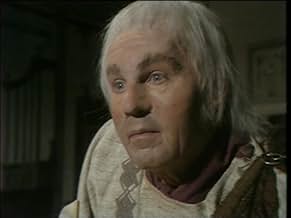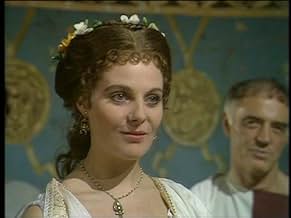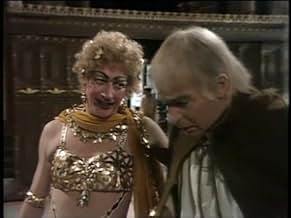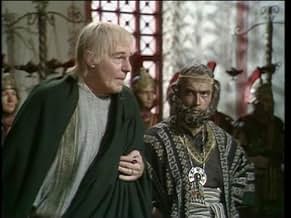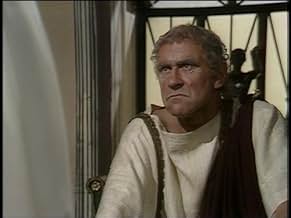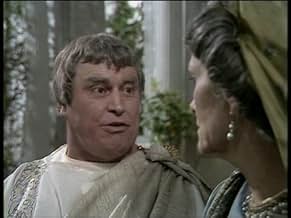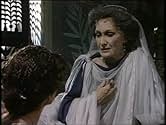Les affaires personnelles et gouvernementales de la dynastie julio-claudienne au début de l'Empire romain, telles qu'elles sont évoquées par l'un de ses souverains.Les affaires personnelles et gouvernementales de la dynastie julio-claudienne au début de l'Empire romain, telles qu'elles sont évoquées par l'un de ses souverains.Les affaires personnelles et gouvernementales de la dynastie julio-claudienne au début de l'Empire romain, telles qu'elles sont évoquées par l'un de ses souverains.
- Récompensé par 1 Primetime Emmy
- 7 victoires et 5 nominations au total
Parcourir les épisodes
Résumé
Reviewers say 'I, Claudius' is acclaimed for its stellar performances by Derek Jacobi, Sian Phillips, and John Hurt. The series is lauded for its engaging storytelling, complex characters, and depiction of Roman political intrigue. While some note historical inaccuracies, the show's historical context is widely appreciated. Its stage-like production and modest budget are seen as strengths, emphasizing character and narrative. Often compared to other historical dramas, it is frequently hailed as a British television masterpiece.
Avis à la une
After reading the reviews on IMDb, I bought the DVD set. I have watched the series countless times since and still continue to marvel at the quality of this work.
For anyone unfamiliar with the early Roman principate, the Julio-Claudian dynasty was in power for a period of about 80 years from Augustus to the death of Nero in 68 AD. This TV series covers the period from about 20 BC to 54 AD - the death of emperor Claudius.
The story is semi-autobiographical, written by Claudius towards the end of his reign and covering the history of his family from Augustus down to the young Nero, his successor.
Murder is the dominating theme, as Augustus' wife Livia artfully dispatches one imperial contender after another so that her son Tiberius can be emperor. It is not simply vanity that drives her machinations, but she is convinced that only Tiberius can keep the principate intact. Should any other candidate take over from Augustus, Rome would descend into civil war and anarchy. It is mostly Livia's actions that drives the story forward.
The acting is top notch. Much has been made about Derek Jacobi's performance, as the lame, stammering, clumsy Claudius. His family does not think much of him, but it is obvious to the viewer that he is a lot smarter and observant then he looks, as he absorbs all the goings on around him to chronicle them later in his book. Jacobi's performance deserves to go into legend, but the quality of the other performances does not allow him to run away with the film. Brian Blessed as the benevolent Augustus, Sian Philipps as Livia are fantastic. George Baker as Tiberius is very good in a particularly difficult role while John Hurt has the most interesting role to play - that of the madman emperor Caligula. The vast supporting cast are all excellent, particularly Patrick Stewart as Sejanus - Tiberius' tough, ruthless and scheming head of the Praetorian Guard.
Considering this is a BBC series with limited budget the production values are great. Direction is first class. Herbert Wise handles the vast story and the army of superb actors with great assurance.
For a drama series the story is quite accurate with history. Just two minor gripes. First the part of Tiberius as written portrays him as very much under the thumb of his mother, with a weak will and indecisive nature. Certain historical facts have contributed to this impression, such as him divorcing the wife he loved to marry Augustus' daughter. But the real life Tiberius was also very efficient and competent, keeping the empire stable during his 23 year reign and leaving the treasury rich. In this series his virtues are not highlighted enough.
Secondly the performance of John Hurt as Caligula. Herbert Wise himself expressed his astonishment at the greatness of Hurt's performance and Hurt certainly gives it a real go. But personally I was disappointed in the way Caligula was portrayed by Hurt. In his interpretation Caligula is a one dimensional madman with cruelty as his dominating urge. No one could disagree given the historical facts, but perhaps due to the freedom allowed in this role Caligula could have been portrayed with more depth, rather than a screaming shouting spoilt young man who believes himself a god. The real Caligula did believed himself to be a god, but perhaps as a result of the absolute power he held in his hands rather than some sort of mental disease. In the way Hurt has chosen to play the role he plays it well. But a more sophisticated interpretation would have rendered Caligula even more believable, and more frightening.
This series has everything, even length - it runs to over 600 minutes. The quality is unwavering throughout. A real treasure to own. It is extremely rare for a work of this quality to be to be realised over such a length, all the more pleasurable for the viewer.
Several writers here have commented that I, Claudius is the greatest ever TV series, the series by which all other TV work should be judged. I cannot agree more.
For anyone unfamiliar with the early Roman principate, the Julio-Claudian dynasty was in power for a period of about 80 years from Augustus to the death of Nero in 68 AD. This TV series covers the period from about 20 BC to 54 AD - the death of emperor Claudius.
The story is semi-autobiographical, written by Claudius towards the end of his reign and covering the history of his family from Augustus down to the young Nero, his successor.
Murder is the dominating theme, as Augustus' wife Livia artfully dispatches one imperial contender after another so that her son Tiberius can be emperor. It is not simply vanity that drives her machinations, but she is convinced that only Tiberius can keep the principate intact. Should any other candidate take over from Augustus, Rome would descend into civil war and anarchy. It is mostly Livia's actions that drives the story forward.
The acting is top notch. Much has been made about Derek Jacobi's performance, as the lame, stammering, clumsy Claudius. His family does not think much of him, but it is obvious to the viewer that he is a lot smarter and observant then he looks, as he absorbs all the goings on around him to chronicle them later in his book. Jacobi's performance deserves to go into legend, but the quality of the other performances does not allow him to run away with the film. Brian Blessed as the benevolent Augustus, Sian Philipps as Livia are fantastic. George Baker as Tiberius is very good in a particularly difficult role while John Hurt has the most interesting role to play - that of the madman emperor Caligula. The vast supporting cast are all excellent, particularly Patrick Stewart as Sejanus - Tiberius' tough, ruthless and scheming head of the Praetorian Guard.
Considering this is a BBC series with limited budget the production values are great. Direction is first class. Herbert Wise handles the vast story and the army of superb actors with great assurance.
For a drama series the story is quite accurate with history. Just two minor gripes. First the part of Tiberius as written portrays him as very much under the thumb of his mother, with a weak will and indecisive nature. Certain historical facts have contributed to this impression, such as him divorcing the wife he loved to marry Augustus' daughter. But the real life Tiberius was also very efficient and competent, keeping the empire stable during his 23 year reign and leaving the treasury rich. In this series his virtues are not highlighted enough.
Secondly the performance of John Hurt as Caligula. Herbert Wise himself expressed his astonishment at the greatness of Hurt's performance and Hurt certainly gives it a real go. But personally I was disappointed in the way Caligula was portrayed by Hurt. In his interpretation Caligula is a one dimensional madman with cruelty as his dominating urge. No one could disagree given the historical facts, but perhaps due to the freedom allowed in this role Caligula could have been portrayed with more depth, rather than a screaming shouting spoilt young man who believes himself a god. The real Caligula did believed himself to be a god, but perhaps as a result of the absolute power he held in his hands rather than some sort of mental disease. In the way Hurt has chosen to play the role he plays it well. But a more sophisticated interpretation would have rendered Caligula even more believable, and more frightening.
This series has everything, even length - it runs to over 600 minutes. The quality is unwavering throughout. A real treasure to own. It is extremely rare for a work of this quality to be to be realised over such a length, all the more pleasurable for the viewer.
Several writers here have commented that I, Claudius is the greatest ever TV series, the series by which all other TV work should be judged. I cannot agree more.
I Claudius is quite possible the supreme example of television drama. It is limited in budget and studio-bound, yet freed from the shackles of a 90-minute theatre slot it can encompass an entire dynasty of rulers and seventy years.
It is sustained by a succession of brilliant performances. Brian Blessed as Augustus combines pathos with violent outbursts that dominate the stage, Sian Phillips as Livia shows us just how charismatic a murderer can be, and over the whole series hangs the shadow of Derek Jacobi as Claudius, fighting against senility and plotting to the last, under the cover of being "Clau-Clau-Claudius the Idiot".
The series mingles comedy with horror and tragedy, and ends with a profoundly pessimistic note about humanity- understandable, given that the reign of Nero, Claudius' successor arguably proved even more bestial and savage than any of his predecessors. Write no more, Claudius, write no more. We have learned no lessons.
It is sustained by a succession of brilliant performances. Brian Blessed as Augustus combines pathos with violent outbursts that dominate the stage, Sian Phillips as Livia shows us just how charismatic a murderer can be, and over the whole series hangs the shadow of Derek Jacobi as Claudius, fighting against senility and plotting to the last, under the cover of being "Clau-Clau-Claudius the Idiot".
The series mingles comedy with horror and tragedy, and ends with a profoundly pessimistic note about humanity- understandable, given that the reign of Nero, Claudius' successor arguably proved even more bestial and savage than any of his predecessors. Write no more, Claudius, write no more. We have learned no lessons.
Based on Robert Graves' famous novel, I, CLAUDIUS is the ultimate soap opera, vicious, cruel, manipulative--and this famous English miniseries grabs the attention and holds fast throughout the entire length of its complex tale of ancient intrigue.
The great strengths of I, CLAUDIUS are in the driving pace, sharp wit, and ferocity of Jack Pulman's script and the host of brilliant performers who play it out. Chief among these are Sian Phillips as the calculating, murderous, and unspeakably cold Livia, wife of Augustus; although Derek Jacobi gives a justly famous performance in the title role, it is Phillips who dominates and drives the story with this, the most brilliant performance of her career. But this is not to disparage the overall cast, which is remarkably fine and includes such noted artists as Brian Blessed, John Hurt, Patricia Quinn, Patrick Stewart, and a host of others.
Like the serpent that appears in the open credits, the story twists and winds--and covers several generations of the ruling family as Rome slips from the republic to royal rule, largely due to the manipulations of Livia, who has few if any scruples in her determination to rule first through her husband and then through her son. Although the look of the film is somewhat dated, it in no way impairs the power of the piece, and I, CLAUDIUS remains one of the handful of miniseries that actually improves upon repeated viewings. Strongly, strongly recommended.
Gary F. Taylor, aka GFT, Amazon Reviewer
The great strengths of I, CLAUDIUS are in the driving pace, sharp wit, and ferocity of Jack Pulman's script and the host of brilliant performers who play it out. Chief among these are Sian Phillips as the calculating, murderous, and unspeakably cold Livia, wife of Augustus; although Derek Jacobi gives a justly famous performance in the title role, it is Phillips who dominates and drives the story with this, the most brilliant performance of her career. But this is not to disparage the overall cast, which is remarkably fine and includes such noted artists as Brian Blessed, John Hurt, Patricia Quinn, Patrick Stewart, and a host of others.
Like the serpent that appears in the open credits, the story twists and winds--and covers several generations of the ruling family as Rome slips from the republic to royal rule, largely due to the manipulations of Livia, who has few if any scruples in her determination to rule first through her husband and then through her son. Although the look of the film is somewhat dated, it in no way impairs the power of the piece, and I, CLAUDIUS remains one of the handful of miniseries that actually improves upon repeated viewings. Strongly, strongly recommended.
Gary F. Taylor, aka GFT, Amazon Reviewer
What can one say that has not already been said about this true masterwork of television? Well, I, Claudius has been a part of my life since I was very young, when me and my mum used to sit and watch, totally rapt in the labyrinthine shenanighans of this most horrid little story...although, at 12 hours long, the story is hardly tiny, but horrid it most certainly is. Every episode is filled with intrigue, murder, violence, nudity, back-stabbing, plotting, incest, insanity and everything else one usually connects with this barbaric, nasty little page of history. The Roman Empire was probably the most corrupt moment of history and Robert Graves' epic novels, here turned into stunning drama by Jack Pulman's brilliant script, blows every other BBC drama clean out of the water. And as for the acting...Brian Blessed is a tornado as the weak-willed Emperor Augustus, while John Hurt gives one of his finest performances as the insane, decadent Caligula. But the true star of this fabulous course of debauchery is Sian Phillips' scheming, evil bitch of Rome, Livia. In one of the finest scenes in the drama, she confronts Claudius and reveals the treachery which has singlehandedly rid herself of all those who have stood in her way, including her own husband. It is a powerhouse performance, and her departure from the second part of the show is sorely missed, but this is compensated for when Hurt takes centre-stage when his unhinged Caligula (nice boy!) plunges Rome into lower depths of depravity and madness. Derek Jacobi, as the foolish, but wise Claudius gives us just enough of his presence to make us aware he is watching quietly while the murders occur, but his presence pervades the entire piece due to his diction, his amazingly baritone voice and because he narrates, even when his birth has not actually occured yet. All in all, a stunning, marvellous piece of entertainment which will never be beaten. I happen to own the entire series on video, and it gets an airing at least once a year...with each new watch revealing subtleties i missed last time. I implore anyone who lives Ancient Rome, good drama or just likes a long wallow in unrepentant horror and blood to watch this drama. You will not be disappointed. Brilliant!!
10SMkShlds
I won't add to the many superlatives ascribed to this wonderful series, well-deserved though they are. But I would like to point out a few vital details that help explain just why it is so wonderful.
(1) Much has been said about Siân Phillips' intense projection of evil, but just how does she do it? If you watch carefully, you'll see she never blinks in her close-up takes, some of which are very long. This gives her a snakelike appearance, which enhances her voice and cold beauty in imparting such an air of menace to everything she says.
(2) Much has also been said about the lack of expensive sets, location shots, or special effects. But the point is that this series is successful because of these apparent deficiencies and not despite them. So much modern cinema and TV is swamped by expensive irrelevances to the detriment of the basics -- writing, acting, and timing. 'I Claudius' shows just how important these things are, and how unimportant those expensive special effects can be.
(3) I had the good fortune to read both books before the series was made, and then to watch it with a critical eye. It was satisfying to see such an expert adaptation, but especially so to see how the central point of the story has not been lost: the inability of any ruler, however powerful, to control what happens at the end of the long chain of command that inevitably forms. I found this a message of lifelong importance in both politics and management, and it is rare indeed that such a remarkable piece of drama and entertainment is also so fundamentally educational.
(1) Much has been said about Siân Phillips' intense projection of evil, but just how does she do it? If you watch carefully, you'll see she never blinks in her close-up takes, some of which are very long. This gives her a snakelike appearance, which enhances her voice and cold beauty in imparting such an air of menace to everything she says.
(2) Much has also been said about the lack of expensive sets, location shots, or special effects. But the point is that this series is successful because of these apparent deficiencies and not despite them. So much modern cinema and TV is swamped by expensive irrelevances to the detriment of the basics -- writing, acting, and timing. 'I Claudius' shows just how important these things are, and how unimportant those expensive special effects can be.
(3) I had the good fortune to read both books before the series was made, and then to watch it with a critical eye. It was satisfying to see such an expert adaptation, but especially so to see how the central point of the story has not been lost: the inability of any ruler, however powerful, to control what happens at the end of the long chain of command that inevitably forms. I found this a message of lifelong importance in both politics and management, and it is rare indeed that such a remarkable piece of drama and entertainment is also so fundamentally educational.
Le saviez-vous
- AnecdotesJohn Hurt revealed that he declined the role of Caligula when it was first offered to him. Because of the time-span of the production, the fact that Derek Jacobi was the only cast member to appear in every episode and the subsequent commitments of the other cast members, Herbert Wise decided to throw a special pre-production party so the entire cast and crew could meet. Wise invited Hurt to the party hoping he would reconsider. When Hurt met the cast and crew, he was so impressed that he immediately took the part.
- GaffesIn the Senate chamber, the famous statue of Romulus and Remus being suckled by a she-wolf is above the door. But the two children were added to the statue in the 15th century.
- Versions alternativesThe show aired in 13 episodes on PBS in 1977, but was originally shown in 12 episodes in England, the first and second episodes having been combined. This is the version now available in the remastered edition on DVD.
- ConnexionsFeatured in The 30th Annual Primetime Emmy Awards (1978)
Meilleurs choix
Connectez-vous pour évaluer et suivre la liste de favoris afin de recevoir des recommandations personnalisées
Détails
Contribuer à cette page
Suggérer une modification ou ajouter du contenu manquant

Lacune principale
What is the Brazilian Portuguese language plot outline for Moi Claude empereur (1976)?
Répondre


